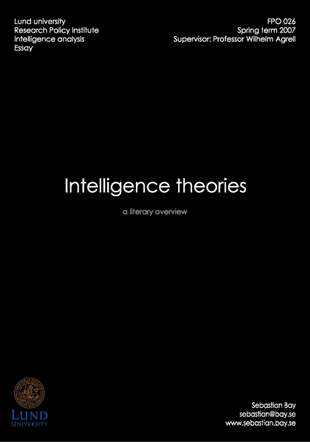Intelligence theories – a literary overview
June 17th, 2009
 “Don’t worry, it’s a slam dunk!” (Tenet cited in Woodward 2004, p.249).
“Don’t worry, it’s a slam dunk!” (Tenet cited in Woodward 2004, p.249).
If former Director of Central Intelligence George Tenet had known that those six words he was about to utter that December morning would become a symbol for the greatest intelligence failure since Pearl Harbor, he might have chosen his words more carefully.
Many have asked what Tenet could and should have known. Just as many have asked whether or not he was influenced in his assessment by various groups of policymakers to the extent that he was forced to provide an answer he knew to be false. Fewer have asked what the limits of intelligence analysis are, and even fewer have asked what can be known and where the boundaries of knowledge are drawn in the field of intelligence.
The intelligence failures of 9/11, Iraq, London, Bali, Madrid and Istanbul have enforced the notion of intelligence as broken, defective and in urgent need of being fixed. Among scholars, this debate has given rise to a surge of activity and discussion and has led to the notion held by many that the field is conceptually weak and in need of theorizing.
How are policies that guide the intelligence services formed and guided? On what assumptions are they based? What is the intellectual and ideological divide? Theory guides us to find these answers, and the study of intelligence must be carried on under this veil to be explicit. Discussions about intelligence theory and the development of conceptual and theoretical thinking about intelligence are here to stay. These discussions are vibrant and sometimes difficult, as new thoughts and provocative ideas challenge how things are and should be done. Even if the contribution of theoretical thinking to the field of intelligence is questioned, it will by all means revolutionize and open up the academic field of intelligence analysis. Theory has become the new “in” in intelligence.
Continue reading my essay here: Intelligence theories – a literary overview
Entry Filed under: Research papers,Undergraduate